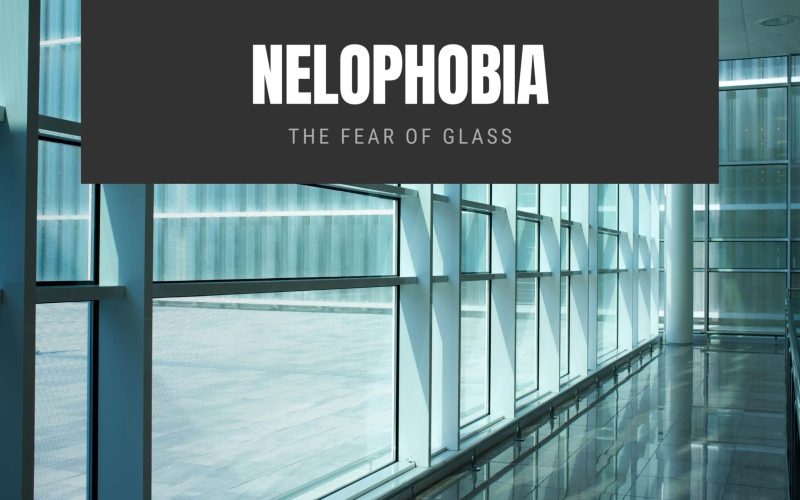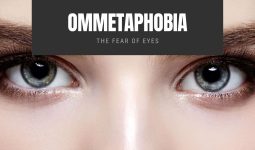Nelophobia, also known as hyelophobia or hyalophobia, is the irrational or extreme fear of glass. People with this phobia fear glass, mostly because of how fragile they seem.
They always feel like they may break easily and cause severe harm. They fear things made of glass, such as glass windows, tables, cups, doors, and more. They also try their best to avoid them.
Persons with this condition are called Nelophobes, and the term “Spasmenagaliaphobia,” which means “Fear of broken glass,” is a branch of Nelophobia since it is highly linked to Nelopobia.
Causes of Nelophobia
Just like other phobias, nelophobias do not have an exact cause, but experts believe that factors that contribute to the development of these conditions could include the following:
Traumatic Experiences
These can involve unpleasant events in the past, which cause a person so much trauma. These unpleasant events can include seeing someone get hurt by a glass that broke away, an accident that involves glass shattering, seeing people injured or killed one another with glass, and more.
Although these experiences may be real life, someone can get traumatized by watching them on TV.
Genetics
Experts suggest that traits are passed down from parents to offspring like fearful genes are passed down.
Meaning that if there are two to four individuals in a person’s family tree who have suffered from a phobia, particularly nelophobia, then there are likely to be more cases in the family.
Upbringing
When you are being raised by a caregiver who has phobias, specifically nelophoia, you are likely to have this fear and not outgrow it.
Environment
Our environment has an extensive supply of factors that can easily influence our lives. They can considerably affect our growth, hence exposing us to elements that can increase the risk of a person developing the phobia.
It is more prevalent when a person grows up in an environment where frequent glass accidents or people are hurt and killed with glass.
Symptoms of Nelophobia
There are a series of symptoms that a sufferer may experience if they have nelophobia, and these symptoms can be triggered when they are triggered due to exposure to their object of fear.
These symptoms are similar across various phobias. However, the severity of these symptoms varies across persons.
Persons with nelophobia may experience the following symptoms when they see, hear, or think of glasses .
Physical Symptoms
Physical symptoms of nelophobia may include any of the following:
- Excess sweating
- Trembling
- Hot flushes
- Shortness of breath
- Choking sensation
- Increased heart rate
- Sharp chest pain
- A feeling of butterflies in the stomach
- Nauseous feeling
- Headaches
- Dizziness
- Feeling faint
- Numbness
- Dry mouth
- Frequent need to go to the toilet
- Ringing or buzzing sounds in the ears
- Confusion or disorientation
- Hyperventilation
- Increased blood pressure
Psychological Symptoms
The following may include psychological effects of nelophobia:
- Fear of losing control
- Fear of fainting
- Feelings of dread
- Fear of dying
- Fear of harm or illness
- The feeling of guilt, shame, and self-blame
- Withdrawing from others
- Feeling sad or hopeless
- Feeling disconnected
- Confusion and difficulty concentrating.
- Anger, irritability, and mood swings
- Anxiety and fear
When you experience up to five of these symptoms when you think or get exposed to glass, then you may be diagnosed with nelophobia. However, certain people have what we call “complex phobia.”
A complex phobia is when an individual has more than one phobia. As mentioned earlier, people with this type of phobia are most likely to experience a chain of symptoms when triggered.
Treatment of Nelophobia
People who have nelophobia may feel that they do not need any treatment because they believe they can avoid the object of fear, in this case, anything that is related to glass.
People with severe cases of nelophobia may find it challenging to handle their assigned tasks as well as carry out their usual daily activities.
Nelophobia, just like any other phobia, can limit a person’s life. It can affect a person’s competence in handling situations or tasks.
The person’s relationship with their environment or loved ones and their usual way of carrying out normal day-to-day activities can also be affected.
Treatment is highly needed to help the individual recover from this condition. However, there are no known treatments for nelophobia, but the following treatments may be applied to help the patients overcome their fear.
Self-care
Self-care is the proper management of self. It is how much you care for yourself to keep yourself happy and healthy.
Self-care involves:
- Exercising: Doing this regularly helps keep you fit and also stirs your mind away from unhealthy thoughts, which may contribute to why you feel fear.
- Healthy dieting: Adopting a healthy diet keeps you healthy and strong. It also helps with cognition and distracts you from your source of fear.
- Relaxation: Stress can worsen your condition, so it’s good for you to take some time to rest. This will keep you calm and controlled at times.
- Meditation: Daily meditation helps you take deeper breaths and calm your mind. It also distracts you from unhealthy thoughts and channels them into a more positive thought pattern.
These are a few of the self-care one can adopt. This makes you more aware of yourself and helps you control your fears and anxieties before they become severe.
Therapy
Talking to a therapist will help you overcome your fears. This is because therapists are trained mental health workers who are equipped with skills to help you attain optimal mental health.
Your consulting therapist is likely to use the following techniques:
- Cognitive-behavioral Therapy (CBT): CBT is the most common technique in treating phobias. Using this technique, your therapist will help you identify those unhealthy thoughts and patterns that cause you to fear glass and then help you replace them with positive ones.
- Dialectical Behavior Therapy (DBT): Traditionally, DBT is a treatment technique used to treat certain personality disorders. However, it can also be used to treat some phobias, including nelophobia. You will be assigned to join a DBT group, where you will be taught coping strategies to help you control yourself even in the face of your source of fear. A DBT group is usually a six-month program, and actively participating may help you recover.
- Mindfulness-Based Stress Reduction (MBSR): MBSR is an eight-week mental health program that consists of group meditation classes. During these classes, participants are taught how to practice mindfulness meditation. The program also includes a group discussion, during which everyone gets to talk about their feelings.
Use of Medications
Although medications are not the cure for phobias, they are administered to help suppress anxiety and other symptoms of phobias.
The drugs include:
- Anti-anxiety medications: This type of drug is administered to reduce anxiety. Valium is a good example of anti-anxiety.
- Anti-depressant medicines: This medication is prescribed because it can lower stress. Lexapro is a common anti-depressant.
Note: These medicines may have a handful of side effects, and using them for a long time may cause addiction and dependence. Therefore, these medications should not be taken outside your doctor’s prescription.







